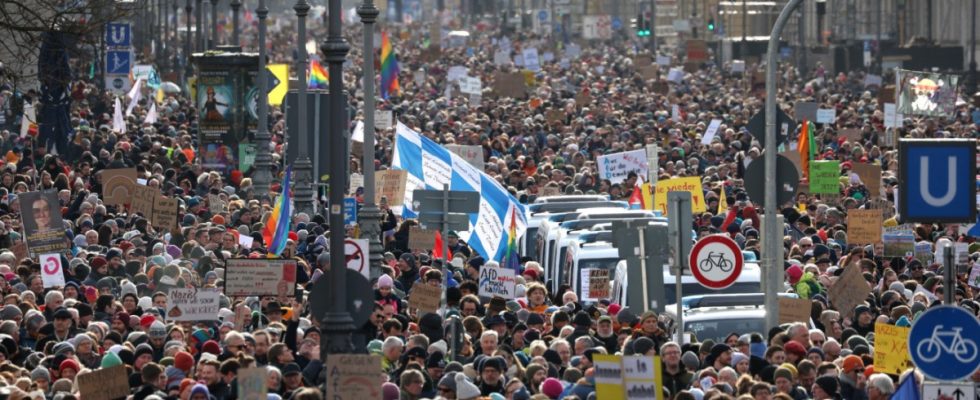The mass of people was impressive and unexpected. Tens of thousands of people came to the “demonstration against the right” in Munich on Sunday afternoon. A single large protest mile formed between Odeonsplatz and Münchner Freiheit. But there was also an unexpected experience that many of the demonstration participants had, and which was directly related to the concentration of so many people in this place: The mobile phone networks of all providers there were unstable between 2 p.m. and 3 p.m., and in some cases nothing worked at all for a short time. The internet could not be accessed, sending SMS or Whatsapp was not possible, and not even telephone calls worked. Were the network operators also surprised by the situation?
Telekom’s networks are also designed for higher utilization, says spokesman Adrian Sanchez. This can be seen, for example, in the fact that the supply is stable even on days like New Year’s Eve with extremely increased data volume. However, he admits that the “short-term, extraordinarily high crowds of people”, which even led to the cancellation of the event in Munich, caused “short-term bottlenecks in our high-performance network”. That was an “extraordinary situation” because apparently so many people in a small space were using their cell phones at the same time and also sending photos or videos.
Vodafone spokesman Volker Petendorf admits that there may have been minor restrictions in some cases, that you might have had to call two or three times to get through, or that uploading videos took a while. However, he does not confirm that the network is overloaded. There was an exceptionally “high capacity utilization for Sunday, but no overload,” says Petendorf, and yes, there was even a “capacity buffer.”
The network operator 1&1 reports that during well-attended major events there can be a “load situation” within the respective cell phone cell and “transitional fluctuations in performance”. However, the group is still in the process of setting up its own network; 1&1 customers in Munich still largely use the Telefónica network, according to spokesman Robin Schmidt. The SZ has not yet received any response from Telefónica.
Nobody had predicted that the demonstration in Munich would be so big. According to the providers, for major events planned for a longer period of time, the radio networks are reinforced by mobile radio masts. “The best example of this is Oktoberfest,” said Telekom spokesman Sanchez. This requires a certain amount of time in advance, but that was not the case here. Vodafone spokesman Petendorf speaks of two to three weeks being necessary for this.
However, the speakers of all three network operators surveyed emphasize one thing above all: emergency calls always go through. “There is always capacity for emergency calls,” says Petendorf. Space would also be created for calls via 112 in overload situations. And this happens across all networks, says Sanchez.

